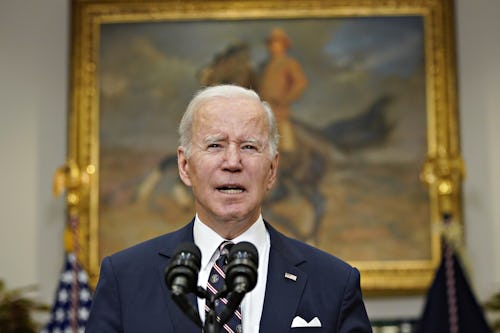
Cancer is among the top 10 leading causes of death in the United States, so it affects a huge number of American families. But for President Biden, it’s a highly personal issue, as his son Beau died of brain cancer in 2015 at the age of 46. That makes Biden’s announcement Wednesday, that his White House will reboot the “cancer moonshot” program, all the more notable.
You might remember the moonshot from Biden’s days as vice president under former President Barack Obama. In 2016 — a year after Beau Biden’s death — Obama put his then-vice president in charge of the Moonshot Initiative to “make a decade’s worth of advances in cancer prevention, diagnosis, and treatment, in five years.”
“It’s personal for me. But it’s also personal for nearly every American, and millions of people around the world,” Biden wrote in a Medium post at the time. “We all know someone who has had cancer, or is fighting to beat it. They’re our family, friends, and co-workers.”
On Wednesday, Biden, first lady Jill Biden, and Vice President Kamala Harris, held a conference to announce the White House’s relaunch of the moonshot initiative. There, Biden shouted out the doctor who worked to save Beau, saying, “That’s the man who spent 18 months trying to save our son’s life. Doctor, I love you.” Harris also detailed her own experience with losing her mother, Shyamala Gopalan, a breast cancer researcher, to colon cancer in 2009.
“After a lifetime working to end cancer, cancer ended my mother’s life. I will never forget the day that she sat my sister and me down and told us she had been diagnosed with colon cancer. It was one of the worst days of my life,” Harris said. “I miss my mother every day. And I carry her memory with me wherever I go.”
The original moonshot program intended to “end cancer as we know it” — and that’s a tagline Biden has retained for its relaunch. Per the White House, the cancer moonshot program also aims to cut the death rate by at least 50% over the next 25 years, and additionally address inequities when it comes to accessing screening, diagnostics, and treatment.
The first iteration of cancer moonshot largely focused on accelerating scientific discovery, fostering collaboration, and improving data sharing. In December 2016, Congress passed the 21st Century Cures Act, which gave the program $1.8 billion in funding to be used over seven years. That money is set to run out in 2023.
With cancer moonshot’s relaunch, Biden is keeping many of the same goals. Although there are currently no new funding asks for the reboot, Biden says he plans to tackle the issue with “renewed White House leadership.” Perhaps most notably, the Biden administration is also forming a “Cancer Cabinet” with members from a number of government agencies, including the Department of Health and Human Services, the Environmental Protection Agency, and the Centers for Disease Control and Prevention.
Obviously, the cancer moonshot program is noble, and it looks good. No matter what political affiliation you have, “fuck cancer” is a pretty universal statement. Biden’s announcement of the program comes right after a new survey from the Pew Research Center that shows that, while Biden came into office with positive ratings, he’s heading into his second year with a lot lower numbers. Reminding everyone he genuinely cares about cancer isn’t a bad idea.







